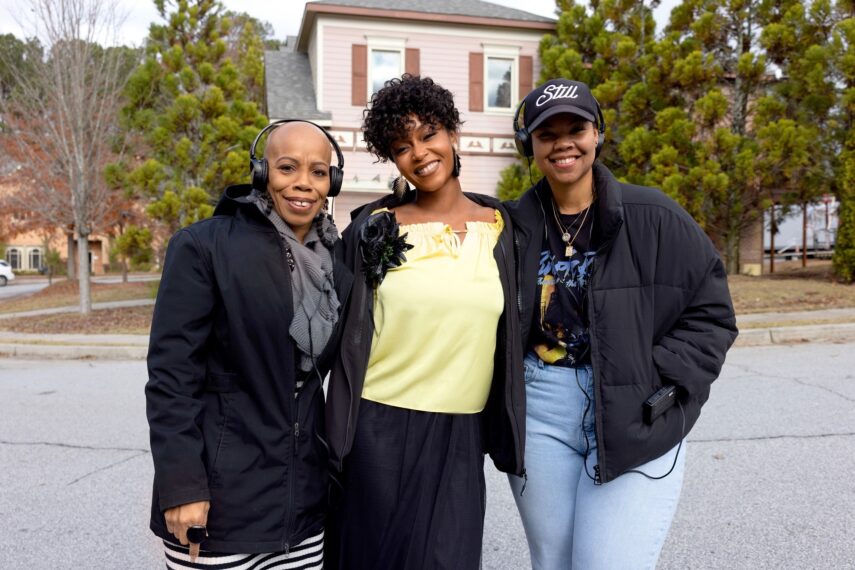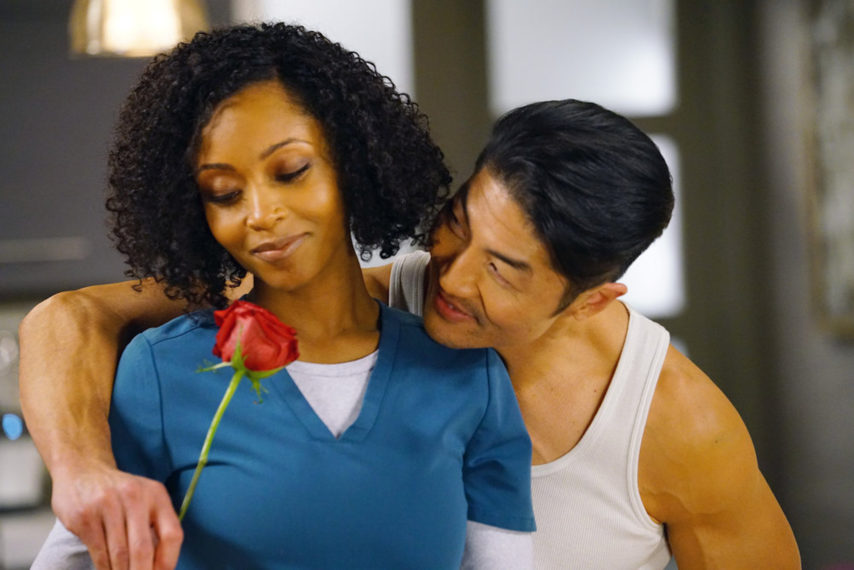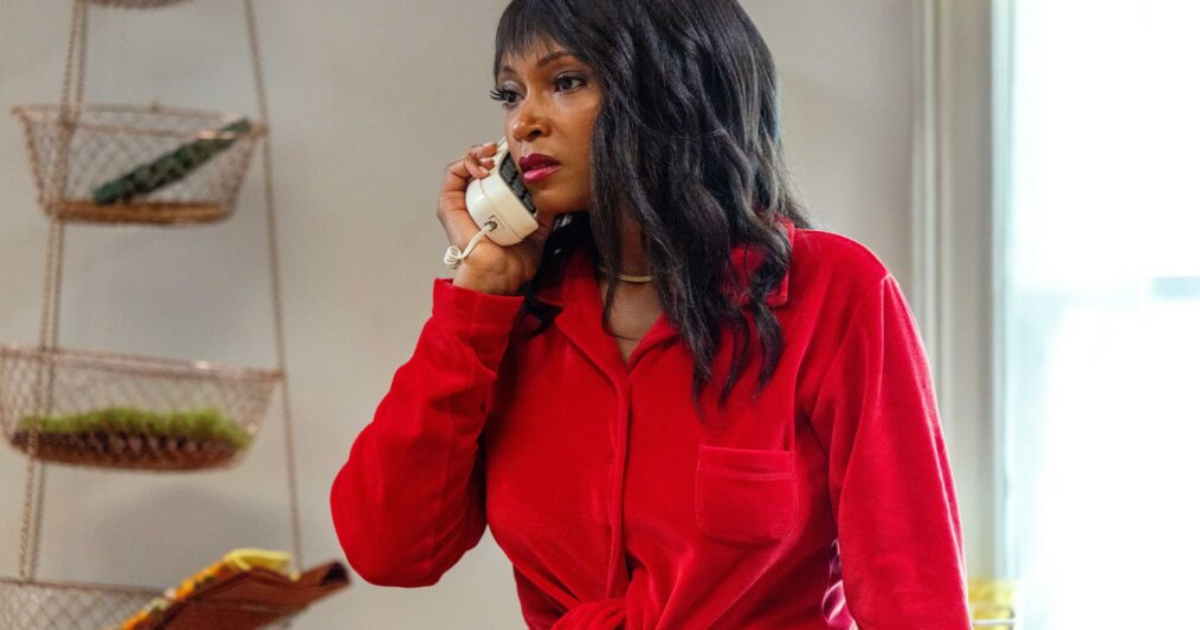Yaya DaCosta dug deep for her starring role in Lifetime’s next “Ripped From the Headlines” project Not My Family: The Monique Smith Story. Premiering April 12, the movie chronicles Smith’s incredible decades-long journey of her true identity upon discovering the relatives she knew weren’t actually blood at all. She endured a horrific childhood in Baltimore filled with fear and abuse from who she thought was her mother and others including two late uncles.
When Smith discovered she didn’t have proper documentation like a birth certificate or social security card, it sent her down a rabbit hole that led to shocking revelations. She left no stone unturned, submitting her DNA for biological matches in a search for answers. Those came at age 55 as analysis showed her biological mother had died years before, lived in New York and also had six sisters. Smith was actually also born Simboli Ruffin. These days she has turned trauma into triumph while taking advocating and helping others through organizations like The Center for Missing and Exploited Children.
This isn’t the first time DaCosta has stepped in the shoes of another. A decade prior the America’s Next Top Model Cycle 3 runner-up played the legendary Whitney Houston for the Lifetime movie Whitney, featuring the directorial debut of Angela Bassett. Since then, DaCosta has starred in All My Children, Ugly Betty, Chicago Fire, Chicago Med, and most recently, The Lincoln Lawyer.
We sat down with DaCosta to talk about what made Not My Family, which she also executive produces, so special. The 42-year-old New Yorker also dives into pivotal parts over her career.

How much did you know about Monique’s story before signing on for the project?
Yaya DaCosta: Before receiving this script, I knew nothing about Monique Smith. What I connected to and did know was that the issue of disappearing humans and human trafficking of all kinds is something that has always infuriated me and confused me. Growing up in Harlem, New York City, and just being aware if I saw a poster or a piece of paper with a missing child’s face on it or a milk carton. Just being so confused about how this could happen. Being so disappointed in the fact I live in a society that doesn’t seem to take this issue more seriously. It’s something that has been a deeply saddening topic for me for so long. When I read her story, it felt like a way out of hopelessness for at least some people who are dealing with this in real life. To know, okay, another end to the story is possible. Like Monique says, “Not all missing children are dead.” There is hope for some people that if you do keep looking and don’t give up you never know what the outcome would be.
You had the unique opportunity to have her on set. What was it like to have her as you’re going through this process?
Monique came to set toward the end of the shoot. Mind you, the shoot was only 13 days. Everything was very fast. Preparation was very fast. I didn’t feel like her presence was a resource in terms of preparation. It was more confirmation when she was there, in between setups, in the dressing room she might pop in and tell a story that gave us more context and depth to a scene.
How would you compare this experience taking on a real person in Monique to what you did 10 years prior with Whitney Houston?
It’s always difficult playing a real human being, someone who has lived or is alive. The main difference is that in doing research in the couple of days I had to do it, for Monique, I’m seeing her in YouTube videos and watching a documentary, looking at her book. It’s skimming with not that much time to prepare. There is this awareness of this being her story, and also because of limited resources and time constraints, there is a certain kind of freedom as the artist to take creative license and make decisions because there is no other option. I had to make certain decisions of how to play these scenes and just pray Monique herself felt good about it. My focus was on making her proud.
She is alive and well. She is a beautiful soul. She is vibrant. She is effervescent. She is the epitome of the saying that someone doesn’t have to look like what they’ve through or act like what they’ve been through. Meeting her you would never know unless she told you. I was focused on her. Now of course playing Whitney, she had already left the planet in physical form. There was really a lot of pressure because it was not just one person to appease. It’s the entire world. There was not one in history whose status of being an icon. She is called “The Voice” for a reason, so there is a lot of pressure there because instead of wanting to please one person, you’re wanting to please billions of people. It was very different.
 CHICAGO MED — “This Could Be The Start of Something New” Episode 809 — Pictured: (l-r) Yaya DaCosta as April Sexton, Brian Tee as Ethan Choi — (Photo by: George Burns Jr/NBC)
CHICAGO MED — “This Could Be The Start of Something New” Episode 809 — Pictured: (l-r) Yaya DaCosta as April Sexton, Brian Tee as Ethan Choi — (Photo by: George Burns Jr/NBC)
It has been 20 years since your onscreen role with Eve. What got you the itch from going from the modeling world to acting? Was there a moment you decided this is what you want to do for a living?
I was at a business conference recently and the speaker asked the audience what their first job was. Mine was an acting job at 11 years old. That’s when I started acting. I did educational films. I was on stage in junior high school. My acting coach at the time Ann Willis Ratray sent me and another student who she thought had promise and talent out on auditions. She got permission from our parents. We started auditioning in New York City. At a very young age, I learned I could make money doing this thing that was so fun. The perception of those who saw me on TV in another capacity is not the reality. I’ve always been an actor.
After fulfilling my obligation to my parents who are educators and getting my college degree from an ivy league university. I was like, “You know what? Before I accept this job in Geneva at the UN, let me just try if I can really do it.” At the urging of my senior roommates to audition for Top Model. I did that, but I was doing a lot of things in order to support my acting career. I tried modeling, but that didn’t last more than three years. I was hostess and waitressing at restaurants. I was teaching Spanish and Portuguese to children in schools. I was doing a lot of things because at that time off Broadway gigs were paying maybe $375 a week. In 2007, I thought I needed to get serious if this was something I really wanted to do. I left it all behind and focused on my acting, and I’m so grateful that I did and to keep working.

When you’re talking about perception and wanting to be taken seriously in acting, I think about Vanessa Williams. You played her daughter in Ugly Betty. She also fought this stigma of being a model and beauty queen. What did you take from working with her during this period?
I love that you brought up that correlation. I don’t remember explicitly speaking to her about it, but I will admit to getting that job, playing with her daughter and feeling very seen and understood. She is an amazing actress. To be in close proximity with that level of excellence. To see how seriously she took her work. To know that she didn’t allow other people’s perceptions or doubts about her legitimate talent as a thespian to get in her way. She knew who she was and acted accordingly. Being with her every day for that time on Ugly Betty was indeed a blessing and reflection and confirmation for me to not worry about what anyone else thought. I know my path. I know it’s a divinely guided path and the masses will catch up one day. And if they don’t, I’m okay because I’m still here and doing what I love.
That is such a gift as so few people get to do that. My star is still shining…I was just sitting around one day and this phone number kept coming into my head. I dialed it. It was Ann Willis Ratray. My acting coach from junior high school. This was right after I’d graduated from college and did that reality show. She was like, “ Of course I remember you. Come to my master’s class.” I went there in her living room every Thursday every week. She had managers visit the class. That’s how I got my manager and then my agent. Rhonda Price saw immediately what I had. I love and respect the fact they took me seriously because at that time there was such a stigma. Reality TV was very new. You really couldn’t tell people you did it if you wanted a shot. Now nobody cares.
You got to jump into April Sexton, which crossed over from Chicago Fire into Chicago Med and even a bit of Chicago P.D. A chance to really flesh out a character on many levels. What did you love most about playing her? Do you think we’ll see her again?
It has been years, and I still get that so often. It warms my heart so much to know that even in an ensemble cast where every character was significant that people still felt the impact of April Sexton and still feel her absence even though the show continues. It moves me. I don’t foresee her returning to the show. I think when I left the first time, there wasn’t any effort put into nicely tying up the storyline. So, when Dr. [Ethan] Choi left, it was a great opportunity for me to come back for a few episodes, get married to him, and go off into the sunset on our mission. I really love that ending. I think it did feel like an ending.
What do you want to tell people before they watch this movie?
In doing this project, I learned so much. Not just about Monique Smith and the missing person epidemic. But myself as an artist. When you have an amazing director as we did in Tailiah [Breon] and so many others. This tone that is set by the way number one on the call sheet shows up on set is so important, especially when you have only a short amount of time to create something meaningful, beautiful and of value. I’m just so amazed that in this 13-day crazy run where there were so many things that were not there that if it was something that…I honestly think this could have been released in the theater. It should have and could have. This is not your normal Lifetime movie. This is a beautiful piece of art that I’m so proud of…Everyone gave their all because we know that Monique Smith and her story and all the missing children in the world deserve our all.
Not My Family: The Monique Smith Story premiere, April 12, 8/7c, Lifetime
